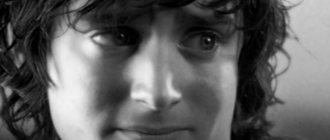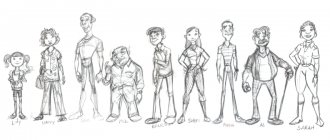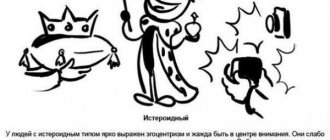Character accentuations in adolescents.
Author: Jumayan Gayane Rkazmikovna
Accentuations are overly expressed character traits that belong to an extreme variant of the norm, bordering on psychopathy. With this feature, some character traits of a person are sharpened, disproportionate in relation to the general personality, leading to a certain disharmony.
The term “personality accentuation” was introduced in 1968 by the German psychiatrist K. Leonhard, who described this phenomenon as overly expressed individual personality traits that tended to transform into a pathological state under the influence of unfavorable factors. Later, this issue was considered by A.E. Lichko, who, based on the works of Leongrad, developed his own classification and coined the term “accentuation of character.” Most character accentuations take shape by adolescence and are often most clearly manifested there.
Let's consider the classification of character accentuations in a teenager.
1. Hyperthymic type. Teenagers of this type are distinguished by their mobility, sociability, and a penchant for mischief. They always bring a lot of noise into the events happening around them, they love restless companies of their peers, while they have good general abilities, they show restlessness, lack of discipline, and study unevenly. Their mood is always good and upbeat. They often have conflicts with adults, parents, and teachers. Such teenagers have many different hobbies, but these hobbies, as a rule, are superficial and quickly pass. Teenagers of the hyperthymic type often overestimate their abilities, are too self-confident, strive to show off, boast, and impress others.
2.Cycloid type. It is characterized by increased irritability and a tendency toward apathy. Teenagers of this type prefer to be at home alone instead of being somewhere with their peers. They have a hard time with even minor troubles and react irritably to comments from the crown. Their mood changes from elated to depressed (hence the name of this type) with periods of about two to three weeks.
3. Labile type. This type is extremely changeable in mood, and it is often unpredictable. The reasons for an unexpected change in mood can be the most insignificant, for example, someone accidentally dropped an offensive word, someone’s unfriendly look. All of them “are capable of sinking into despondency and a gloomy mood in the absence of any serious troubles or failures.” Much in their psychology and behavior depends on the momentary mood of these teenagers. According to this mood, the present and future for them can be colored either with rosy or gloomy colors. Such teenagers, when they are in a depressed mood, are in dire need of help and support from those who could improve their mood, who can engage them, encourage them, and entertain them.
4. Astheno-neurotic type. This type is characterized by increased suspiciousness and capriciousness, fatigue and irritability. Fatigue is especially common when performing a difficult task. The tendency towards hypochondria is a particularly typical feature.
5. Sensitive type. He is characterized by increased sensitivity to everything: to what pleases and to what upsets or frightens. These teenagers do not like big digging, too gambling, active, mischievous games. They are usually shy and timid in front of strangers and therefore often come across as withdrawn. They are open and sociable only with those whom they know well; they prefer communication with children and adults to communication with peers. They are obedient and show great affection for their parents. In adolescence, such adolescents may experience difficulties adapting to their peer circle, as well as an “inferiority complex.” At the same time, these same teenagers develop a sense of duty quite early and develop high moral demands on themselves and the people around them. They often compensate for deficiencies in their abilities by choosing complex activities and increased diligence. These teenagers are picky about finding friends and acquaintances for themselves, show great affection in friendships, and adore friends who are older than them.
6. Psychasthenic type. These teenagers are characterized by early intellectual development, a tendency to think and reason, to introspect and evaluate the behavior of other people. Such teenagers, however, are often stronger in words than in deeds. Their self-confidence is combined with indecision, and categorical judgments are combined with hasty actions taken precisely at those moments when caution and prudence are required.
7. Schizoid type. Its most significant feature is isolation. These teenagers are not very drawn to their peers; they prefer to be alone, in the company of adults. “Mental loneliness does not even burden the schizoid teenager, who lives in his own world, with his interests, which are unusual for children of this age.” Such teenagers often demonstrate outward indifference to other people and lack of interest in them. They do not understand well the conditions of other people, their experiences, and do not know how to sympathize. Their inner world is often filled with various fantasies and special hobbies. In the external manifestation of their feelings, they are quite restrained and are not always understandable to others, especially to their peers, who, as a rule, do not like them very much.
8. Epileptoid type. These teenagers often cry and harass others, especially in early childhood. “ Such children love to torture animals, beat and tease the younger and weaker, mock the helpless and unable to fight back. In a children's company, they claim not just leadership, but the role of ruler. In the group of children they control, such teenagers establish their own strict, almost terroristic orders, and their personal power in such groups rests mainly on the voluntary obedience of other children or on fear. Under conditions of a strict disciplinary regime, they often feel at their best, “they know how to please their superiors, achieve certain advantages, take possession of... posts that give... power, and establish dictatorship over others.”
9. Hysterical type. The main feature of this type is egocentrism, a thirst for constant attention to one’s own person. Adolescents of this type have a tendency towards theatricality, posing, and panache. Such children can hardly stand it when their friend is praised in their presence, when others are given more attention than themselves. “The desire to attract attention, to listen to admiration and praise becomes an urgent need for them.” Such teenagers are characterized by claims to an exclusive position among their peers, and in order to influence others and attract attention to themselves, they often act in groups as instigators and ringleaders. At the same time, being unable to act as real leaders and organizers of the cause, or to gain informal authority, they often and quickly fail.
10. Unstable type. He is sometimes mischaracterized as weak-willed and going with the flow. Adolescents of this type show an increased tendency and craving for entertainment, indiscriminately, as well as for idleness and idleness. They do not have any serious interests, including professional ones, and they hardly think about their future.
11. Conformal type. This type demonstrates thoughtless, uncritical, and often opportunistic submission to any authority, to the majority in the group. Such teenagers are usually prone to moralism and conservatism, and their main life credo is “to be like everyone else.” This is a type of opportunist who, for the sake of his own interests, is ready to betray a comrade, to leave him in difficult times, but no matter what he does, he will always find an excuse for his action, and often more than one.
Accentuation of character when exposed to unfavorable conditions can lead to pathological disorders and changes in personality behavior, to psychopathy.
Psychopathy (from the Greek psyche - soul and pathos - “disease”) is a pathology of character in which the subject has an almost irreversible expression of properties that prevent his adequate adaptation in the social environment. Unlike accentuations, psychopathy is permanent, manifests itself in all situations and interferes with the social adaptation of the individual. The reactions of a person with sharpened character traits, compared to the reactions of a psychopath, are more closely related to psychotraumatic factors, while maintaining a certain self-control. There are no limits for a psychopath.
When they talk about the presence of a certain character in someone, they thereby indicate a certain one-sidedness of his mental organization, a certain disharmony of the psyche. In fact, about a normal “ideal” person it is impossible to say what kind of character he has, because
all his behavior is a simple reaction to external influences. It is necessary to note the vagueness and uncertainty of the boundaries between individual psychopathy. The identified forms of psychopathy are for the most part an artificial product of schematic processing of what is observed in reality. At the same time, the behavior of psychopaths of the same type can be different: one paranoid person can be a universally recognized scientist, another can be mentally ill, etc. Based on the fact that, in a mild form, certain psychopathic features are inherent in all normal people, it is clear that the more sharply an individuality is expressed, the brighter the psychopathic features characteristic of it become. This is probably why among highly gifted people, with a richly developed emotional life and easily excitable imagination, there is a significant number of undoubted psychopaths. comments powered by HyperComments
Provoking factors
It is worth considering that certain circumstances may influence the development of accentuations.
- Excessive parental care, control on their part. Affects the worsening or appearance of sensitive, psychasthenic and asthenic accentuation.
- Lack of parental attention and care. Promotes the development of hysterical, conformal or unstable traits.
- A harsh attitude and excessive severity enhances the epileptoid type.
- Too high demands on your child provoke the development of a psychasthenic type.
- The lack of an emotional connection with the child leads to the strengthening or development of a sensitive, labile or asthenic type.
- Excessive attention to the child’s health and chronic diseases affects the development of astheno-neurotic and hysterical accentuation.
- Conflicts with peers can lead to the formation of conformal as well as schizoid accentuation.
Common factors include:
- inability to receive satisfaction in love, attention or communication;
- lack of such concepts as cultural and moral norms;
- the presence of incorrect self-esteem, the development of inferiority;
- lack of hobbies, goals in life, aspirations;
- genetic predisposition
Asthenoneurotic
This accentuation is noticeable from birth. More than others it looks like a pathology. The child suffers from restless sleep and nightmares, involuntary urination, and poor appetite. He is fearful and whiny. Prone to fatigue, irritability, and contemplating illnesses.
At the same time, he is efficient, careful and obedient. He quickly gets bored with the company of his peers. He does not enter into open “war” with his parents, but harbors a grudge. This type develops against the background of emotional coldness of parents or with excessive care. Fears are associated with health.
Critical situations
Competition, rivalry, high stress (physical and mental), conflict, active communication, making strong-willed decisions, changing the usual lifestyle, criticism (especially incorrect).
Tendency to deviate
Not inclined.
Recommendations for parents
It is important to eliminate pressure and criticism and create situations of success. It’s worth starting a conversation with a joke, a pleasant memory (to switch from grievances). You cannot offend a child or other family members or be offended at each other. It is necessary to change the child’s attitude to the idea that the world is good.
Hysterical
These teenagers love to be the center of attention. They need admiration. These are very self-centered individuals. If they cannot achieve a positive attitude, then they achieve a negative one.
The only thing that is destructive for hysterics is indifference. They are wonderful actors, liars, dreamers. As a rule, they are not capable of deep feelings, but they can play them. They always achieve what they want. They can be organizers and leaders.
Dangers
To attract attention, they can commit suicide, get sick, join a strange group, or run away from home. This type arises against the background of permissiveness. Dangerous due to hysterical psychoses.
Critical situations
Ignoring their personality, loneliness, restrictions in self-expression, instructions for tasks, disadvantage, dislike and non-recognition by others, measured, same-type life and work.
Tendency to deviant behavior
Ostentatious running away from home, ostentatious drinking, ostentatious suicide attempts.
Recommendations for parents
It is important to present to a teenager his demonstrativeness as a dominant trait. To do this, you need to jointly understand the motives and reasons for the child’s actions, and then teach him a more correct way to satisfy his desires.
It is useful to watch films and read literature where the main character has such an accentuation. You can direct energy in the right direction through social events (for example, organizing discos at school). To overcome egocentrism, you need to encourage the slightest efforts of a teenager towards other people: stories about other people's achievements, lives.










